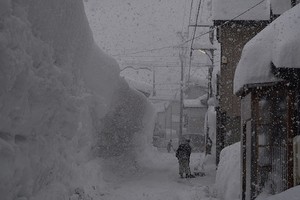THE ASAHI SHIMBUN
January 8, 2021 at 18:17 JST
 A man looks at an electronic stock board showing Japan's Nikkei 225 and New York Dow indexes at a securities firm in Tokyo on Jan. 7. (AP Photo)
A man looks at an electronic stock board showing Japan's Nikkei 225 and New York Dow indexes at a securities firm in Tokyo on Jan. 7. (AP Photo)
Another contraction in Japan’s gross domestic product is forecast due to the latest state of emergency to fight the novel coronavirus pandemic, along with the loss of 86,000 jobs, economists say.
A month-long state of emergency, the second since last April, was declared Jan. 7 for Tokyo and neighboring Kanagawa, Saitama and Chiba prefectures following a recent surge in new COVID-19 cases. The measure will be in place until Feb. 7.
Consumer spending, which accounts for more than half of the country’s GDP, will likely be hit hard if more people continue to stay at home and spend less on dining out and outdoor leisure activities during the period.
The decision is expected to shrink GDP in real terms by 900 billion yen ($8.6 billion) a month, according to an estimate by Daiwa Institute of Research. Consumer spending is forecast to drop by 700 billion yen, or around one-sixth of the decline recorded during the first nationwide state of emergency, the institute added.
The declaration last April dealt a heavy blow not only to consumer spending but also exports and capital investment. The nation's GDP shrank at an annualized rate of nearly 30 percent in real terms in the April-June quarter.
Many economists expect the GDP contraction will be smaller this time since areas and types of businesses targeted under the current state of emergency are limited.
However, the economy has yet to recover to the pace expected and the GDP figure remains far below pre-pandemic levels. This all points to yet another economic contraction, they say.
Daiwa Institute of Research forecasts a 0.3 percent annualized contraction in the current January-March quarter, while Mitsubishi UFJ Research and Consulting predicts it will be 2.5 percent.
“The decision (on the second declaration) came late because the government was worried about the negative impact on the economy,” said Shinichiro Kobayashi, a senior economist at Mitsubishi UFJ Research and Consulting. “That resulted in a further deterioration in the economy.”
There are also fears the government will be forced to extend the current state of emergency or expand target areas if it fails to contain the spike in COVID-19 cases within a month.
“(The extension and expansion of the state of emergency) will significantly raise the risk of a double-dip recession,” said Keiji Kanda, a senior economist at Daiwa Institute of Research.
Employment is also likely to worsen in the days and weeks ahead.
As of Jan. 6, the number of workers who were expected to lose or had already lost their jobs due to the pandemic topped the 80,000 mark to reach 80,121, according to the labor ministry. The figure had been declining on a monthly basis since last October but began rising in December.
The jobless figure could increase by 86,000 six months from now, according to an estimate by Toshihiro Nagahama, a chief economist at Dai-ichi Life Research Institute.
“If the state of emergency is extended or targets wider areas, more people will lose their jobs,” Nagahama said. “The estimated figure (of 86,000) is based on a best-case scenario and could get much worse.”
The government intends to quickly implement an additional stimulus package to minimize the negative impact of the emergency declaration on the economy and employment.
However, the package was compiled before calls for a second state of emergency grew. Diet deliberations on related budget bills and other policy measures will likely draw more public attention.
(This article was written by Tomohiro Yamamoto and Ken Sakakibara.)




















A peek through the music industry’s curtain at the producers who harnessed social media to help their idols go global.
A series based on diplomatic documents declassified by Japan’s Foreign Ministry
Here is a collection of first-hand accounts by “hibakusha” atomic bomb survivors.
Cooking experts, chefs and others involved in the field of food introduce their special recipes intertwined with their paths in life.
A series about Japanese-Americans and their memories of World War II